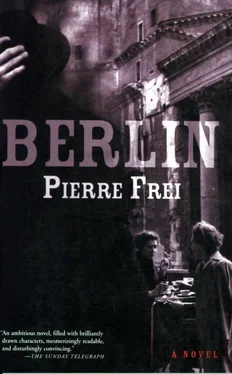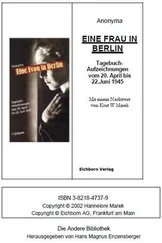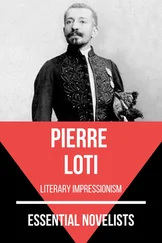She revived when she was allowed to start teaching a Spanish course at a new adult education centre. And she was finally allotted a room too, in the basement of a villa in Katharinenstrasse, quite close to Detta. A photograph on the chest of drawers showed the Baron in gumboots inspecting a breeding bull. Both the Baron and the bull looked happy.
The way to work wasn't far: over the Waltraudbriicke to Argentinische Allee and then to Oskar-Helene-Heim U-Bahn station. Opposite stood the buildings of what had been the Luftgaukommando, which the Americans had made their Berlin headquarters, and by virtue of their liking for absurd acronyms called oMGUS, 'Office of the Military Government of the United States'. The sandstone facades of the Third Reich were intact and the same as ever. The smell of Nescafe and Virginia cigarettes in the polished corridors was new.
Detta went that way every day, and every day the blind man met her. He was a youngish man, small, with dark glasses and a white stick, wearing a uniform mended in several places and bearing the outline of a Luftwaffe eagle that had been removed from its breast. She supposed he lived somewhere nearby.
She felt sorry for him. But it would have gone no further — she was in no mood to make new acquaintances — if he hadn't almost walked into the path of a car one morning. She grabbed his sleeve and held him back. He was alarmed, then understood and thanked her. 'I know you. I know your footsteps. We meet here every morning, don't we? I'm taking my daily constitutional, so as not to get old before my time.'
'Come on.' Detta took his arm and led him across the street. 'Have a good morning,' she wished him on the other side. He walked away, his footsteps sure. He obviously knew every paving stone.
Her new daily routine began as she showed her pass to the guard at the entrance. Lieutenant Anny Randolph, personal assistant to the city commandant, was waiting for her in the outer office with a black coffee. It had taken a little while for Detta to get used to it: the Americans boiled their coffee instead of brewing it. 'Hi, Detta, how are you this morning?'
'Thanks, Anny, swell,' said Detta, imitating the lively New Yorker's speech. 'What's on?'
'The boss wants to see you. The people wanting a newspaper licence have an appointment at eleven.'
A normal working day began. Colonel Tucker, adjutant to the city commandant, looked in briefly, but there was nothing for him. Mr Gold, the inscrutable representative of the State Department, who apparently didn't speak a word of German although he came from Frankfurt am Main, brought the city commandant an envelope with 'Confidential' stamped on it, and Anny Randolph gave him a receipt. Herr Bongarts did his weekly round with his little bottle and brush, disinfecting the four hundred phones in OMGUS. The Americans feared germs even more than Communism.
Henry Abbot rose courteously when Detta entered his office, and pointed to one of the armchairs. 'Do sit down, Henriette.'
'Thank you, sir. It's about the licence to publish a new Berlin newspaper, isn't it?'
'My press officer Major Landon has checked up on the applicants. He has no reservations about them, but I'd like you to see them both. I rely a great deal on your understanding of human nature.'
'Only a bit of common sense, General,' said Detta.
The German visitors were punctual. Detta introduced them to the general. Hermann Lbttge was a printer and had the necessary machinery. He didn't say much, but his partner talked enough for two. 'I shall look after the publishing side. I've had years of organizational experience in the Ministry of Economic Affairs, entirely apolitical, as you can see from my files. My school friend Leo Wolf will be editor-in-chief and put the editorial team together. He was in a concentration camp,' he concluded on a triumphant note.
Detta interpreted. Henry Abbot listened attentively. 'Does having been in a concentration camp automatically qualify you for the post of editor-inchief?'
'Oh, please, commandant! The man is Jewish, of course. They're the cleverest folk you can find. Apropos of which, I would just like to say that I helped many of my Jewish fellow countrymen. I can prove it.'
The Goldbergs, for instance, thought Detta. She had recognized former Under-Secretary Aribert Karch at once. He obviously didn't know what to make of her. 'For a moment I thought we'd met before,' he said when they were back in the outer office.
'You thought correctly, Herr Karch. At Miriam Goldberg's farewell party in Gumbinner Allee. You were generously helping her and her family to get out of the country at the time. I'll write to her in America. I'm sure she'll support your application for a licence. By the way, do you still belong to the Circle of Friends of the Reichsfiihrer SS?'
Karch winced as if he had toothache. 'We all had to move with the times.'
And some of us moved further than others.'
'I don't understand a word of this,' said the printer.
'It does you credit, Herr Luttge. Goodbye, gentlemen.'
'Herr Karch has withdrawn his application,' she told the general.
'Couldn't he have done so a little earlier?' growled Henry Abbot, annoyed.
'He needed a little coaching.'
The blind man moved away from the street light on the corner of Waltraudstrasse and fell into step with Detta. 'I heard you coming a long way off. How are you this morning? I've been thinking of you all night. You are beautiful. A real lady. I can tell from your voice. I once knew many beautiful women. None of them have any time for me today. But you're different.'
Detta bristled. The fact that she had kept him from an accident yesterday gave him no right to take liberties. 'Excuse me. I'm in a hurry.'
She walked faster, but he was not to be shaken off. His stick kept time with her footsteps. It somehow sounded threatening. 'You work for the Americans, don't you? You'll be showing them what German punctuality is like. Unfortunately none of that concerns me now, out of service as I am. Who'd be interested in whether I arrived late or indeed at all?'
The guard would stop him following her in. She wasn't in the mood for this chatter. He took her silence as interest. 'Not so long ago it was different. The ground crew welcomed me back with a bottle of bubbly for every victory in the air. I got the Knight's Cross after the twenty-fifth.'
Thank goodness, the guard. 'I'm afraid you can't come any further. Goodbye.'
'Brandenburg, Captain Jurgen Brandenburg, Richthofen Fighter Squadron,' he called after her.
The city commandant was in unusually high spirits. 'Guess what, Henriette, I found a completely intact, seaworthy yacht in the Wannsee wharf. All mahogany and teak. A fine boat. The old boat builder there says it will take him a month to strip the Astra down. He'll do it for a few cartons of cigarettes. And then Colonel Hastings of Transport Command will take her to Bremerhaven for me, and we'll ship her home. Six weeks in the shipyard and she'll be like new.'
'What about the owner?'
'Some German.'
Detta was indignant. 'I am "some German" too, General Abbot. Unfortunately I don't have anything you can take away from me and ship home. If you'd excuse me. '
'One moment, Henriette.'
He's going to fire me, she thought.
'The owner of the yacht is called Erpenborg, a stamp dealer. A nice old fellow who doesn't sail any more. We agreed that I'd send the estimated value in dollars to his sister's account in Rio. She'll use it for her children there.'
'Will you accept my apology, sir?'
'Only if you'll come to dinner with us this evening. We have a surprise for you. Lucy likes you very much. So do I.' Embarrassed, he looked at the floor. Then he was the correct West Point officer again. 'Well, now to work. What do we have?'
Читать дальше












